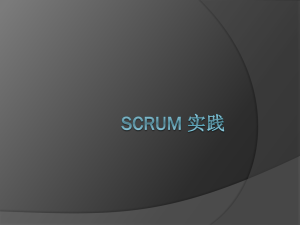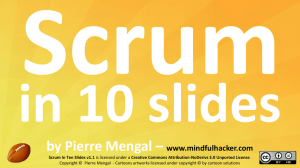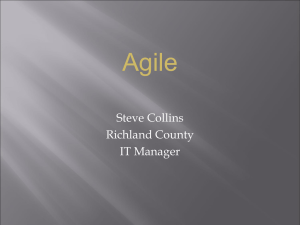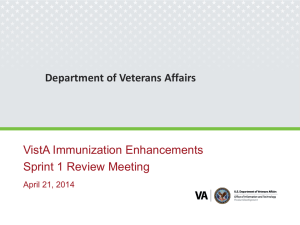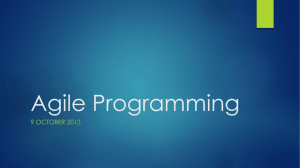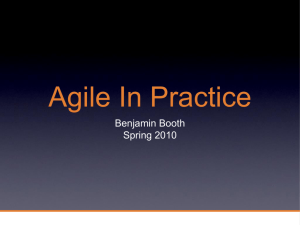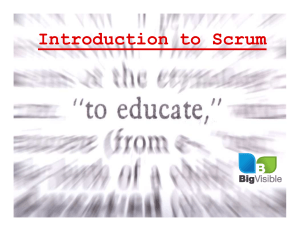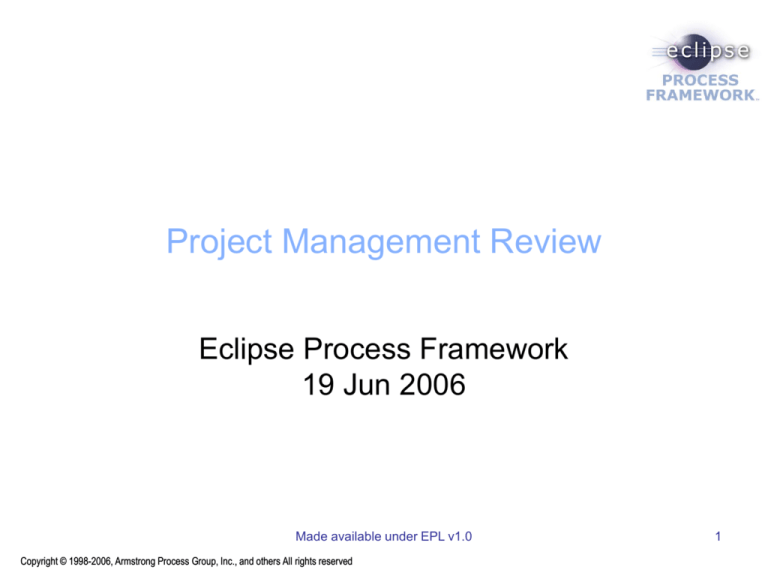
Project Management Review
Eclipse Process Framework
19 Jun 2006
Made available under EPL v1.0
Copyright © 1998-2006, Armstrong Process Group, Inc., and others All rights reserved
1
Objectives
• Review OpenUP/Basic PM elements and EPF examples
–
–
–
–
–
Project plan
Iteration plan
Work items list
Risk list
Status assessment
• Compare/align with Scrum
–
–
–
–
Release burndown
Product backlog
Sprint backlog
Sprint burndown
• Discussing piloting (i.e. “testing”) OpenUP/Basic content
Made available under EPL v1.0
Copyright © 1998-2006, Armstrong Process Group, Inc., and others All rights reserved
2
OpenUP Project Plan – Definition
• Brief description
– This artifact gathers all information required to
manage the project. Its main part consists of a
coarse-grained plan, containing project phases and
milestones.
• Purpose
– The purpose of the Project Plan is to provide a central
document where the any project team member can
find the information on how the project will be
managed.
Made available under EPL v1.0
Copyright © 1998-2006, Armstrong Process Group, Inc., and others All rights reserved
3
OpenUP Project Plan – Implied Content
•
•
•
•
•
•
•
Project constraints
Scope and duration
Measurements
Phases and milestones
Number, length, and objectives of iterations
Staffing
Development process
Implied content based on steps of Task: Plan the
Project
Made available under EPL v1.0
Copyright © 1998-2006, Armstrong Process Group, Inc., and others All rights reserved
4
OpenUP Project Plan – Observations
• Implied content does not match current template
– Updating template already in Bugzilla
• Really do not have an OpenUP Project Plan for
EPF project
– Development plan is close
– Doesn’t appear to have been maintained
• Didn’t we add another iteration?
• Iteration goals don’t quite line up any more; some should be
removed (i.e. agile stuff)
Made available under EPL v1.0
Copyright © 1998-2006, Armstrong Process Group, Inc., and others All rights reserved
5
OpenUP Project Plan – Observations
• Put iteration “goals” in project plan
– Similar to what is in current development plan for
each milestone
– Put iteration “objectives” in iteration plans
– Based on premise that goals are more abstract and
coarse-grained than objectives
• Should OpenUP have a “release planning”
element?
– Should we rename the step in Task: Plan the Project
“Plan project scope and duration” to “Plan releases”?
Made available under EPL v1.0
Copyright © 1998-2006, Armstrong Process Group, Inc., and others All rights reserved
6
OpenUP Iteration Plan – Definition
• Brief description
– This artifact is a fine-grained plan describing the
objectives of a given iteration and how they will be
evaluated. It contains a list of work assignments for
the particular iteration.
• Purpose
– Facilitating the communication of the goals,
objectives, tasks and assignment for a given iteration.
Made available under EPL v1.0
Copyright © 1998-2006, Armstrong Process Group, Inc., and others All rights reserved
7
OpenUP Iteration Plan – Implied Content
• Objectives (“high-level tasks” or “goals”)
– Related to risks, timebox, requirements
• Iteration tasks (“smaller tasks”)
• Allocated work items
• Elements to test
Implied content based on steps of Task: Initiate
Iteration and Task: Plan Iteration
Made available under EPL v1.0
Copyright © 1998-2006, Armstrong Process Group, Inc., and others All rights reserved
8
OpenUP Iteration Plan – Observations
• Implied content does not match current template
– Mixes “objective” and “task” as same thing
– Updating template already in Bugzilla
• How to the “items” in the iteration plan relate to
EPF metamodel elements?
– Are they activities, tasks, steps, descriptors, etc???
• There appear to not be any iteration plans for
EPF project
Made available under EPL v1.0
Copyright © 1998-2006, Armstrong Process Group, Inc., and others All rights reserved
9
OpenUP Work Items List – Definition
• Brief description
– This artifact contains all work that has to be done in
project.
• Purpose
– To collect all work that has to be done in a project,
so work can be prioritized and effort estimated.
Made available under EPL v1.0
Copyright © 1998-2006, Armstrong Process Group, Inc., and others All rights reserved
10
OpenUP Work Items List – Implied Content
•
•
•
•
•
Name
Type
Priority
Estimate
Release
Implied content based on Artifact: Work Items List
Made available under EPL v1.0
Copyright © 1998-2006, Armstrong Process Group, Inc., and others All rights reserved
11
OpenUP Work Items List – Observations
• Appears that this is a collection of requirements
and change requests and tasks
– However, it is not the requirements or the change
requests
– It is a convenient place to prioritize them
• Used to assign work to individual team members
for specific iterations
• Perhaps work items are assignable tasks related
to requirements and change requests
– What do we do with tasks that aren’t related to
requirements or change request (such as processrelated tasks like project planning and establishing a
development environment)?
– Should we just call
this the “task list”?
Made available under EPL v1.0
12
Copyright © 1998-2006, Armstrong Process Group, Inc., and others All rights reserved
OpenUP Work Items List – Observations
• Appears that Bugzilla is the work item list for EPF project
• However, some “items” need to be broken down into
more fine-grained “item”
– For example, “#146662: All disciplines: no discipline text” might
need to be broken into smaller items, one for each discipline
– Perhaps “All disciplines will have explanatory text” is the detailed
“requirement” and the items for each discipline are the “work
items”
• There are no detailed requirements for EPF project
documented anywhere
– There are change requests (and a lot of them for “missing”
requirements)
Made available under EPL v1.0
Copyright © 1998-2006, Armstrong Process Group, Inc., and others All rights reserved
13
Scrum Product Backlog – Definition
• The Product Backlog is the master list of all functionality
desired in the product
• Product Owner prioritizes the items in the Product
Backlog
• Team determines which items they can complete during
the coming Sprint
• The team then moves items from the Product Backlog to
the Sprint Backlog
• In doing they expand each Product Backlog item into
one or more Sprint Backlog tasks so they can more
effectively share work during the Sprint
• A very interesting prospect is expressing Scrum backlog
items in the form of Extreme Programming's User
Stories.
From Mike Cohn @ Mountain Goat Software
Made available under EPL v1.0
Copyright © 1998-2006, Armstrong Process Group, Inc., and others All rights reserved
14
Scrum Product Backlog – Content
•
•
•
•
•
Priority
Item #
Description
Estimate
Assigned To
Made available under EPL v1.0
Copyright © 1998-2006, Armstrong Process Group, Inc., and others All rights reserved
15
Scrum Product Backlog – Observations
• As it is defined as a list of all product capabilities, it
seems as these are the product requirements
– OpenUP Features, Use-Case Model, and Supporting
Requirements (and/or perhaps scenarios) are same as Scrum
Product Backlog
• Items on product backlog are decomposed into smaller
tasks on sprint backlog
– Implies product backlog items and sprint backlog items are not
the same thing, but related
– In certain situation a single product backlog item may become a
single sprint backlog items, but this may be the exception, not
the rule
– Supports idea than an OpenUP work item is one or many tasks
related to implementing a requirement or change request
Made available under EPL v1.0
Copyright © 1998-2006, Armstrong Process Group, Inc., and others All rights reserved
16
Scrum Sprint Planning and Assessment
• Collectively the Scrum Team and the Product Owner
define a "Sprint Goal," which is a short description of
what the sprint will attempt to achieve
– The success of the sprint will later be assessed during the Sprint
Review Meeting against the Sprint Goal, rather than against
each specific item selected from the Product Backlog
• During the Sprint Review Meeting the project is
assessed against the Sprint Goal determined during the
Sprint Planning Meeting
– Ideally the team has completed each task planned for the sprint
but it is more important that they achieve the overall goal of the
sprint
• Implies a distinction between iteration goals/objectives
and tasks
Made available under EPL v1.0
Copyright © 1998-2006, Armstrong Process Group, Inc., and others All rights reserved
17
Scrum Sprint Backlog – Definition
• The Sprint Backlog is the list of tasks that the
Scrum Team is committing that they will
complete in the current Sprint
• Items on the Sprint Backlog are drawn from the
Product Backlog by the team based on the
priorities set by the Product Owner and the
team's perception of the time it will take to
complete the various features
Made available under EPL v1.0
Copyright © 1998-2006, Armstrong Process Group, Inc., and others All rights reserved
18
Scrum Sprint Backlog – Content
• Assigned To
• Description
• Estimated effort per week
Made available under EPL v1.0
Copyright © 1998-2006, Armstrong Process Group, Inc., and others All rights reserved
19
Scrum Sprint Backlog – Observations
• Appears to not be prioritized
– Only the Product Backlog is prioritized
– Sprint tasks inherent the priority from their related
backlog items?
Made available under EPL v1.0
Copyright © 1998-2006, Armstrong Process Group, Inc., and others All rights reserved
20
Scrum Burndown
• Burndown is a trend report showing the amount
of work remaining for a period of time
• Release burndown
– Shows amount of work remaining based on “points” –
measure of requirements coverage based on scope
and complexity
• Sprint burndown
– Shows amount of work remaining based on time
estimates of allocated tasks
Made available under EPL v1.0
Copyright © 1998-2006, Armstrong Process Group, Inc., and others All rights reserved
21
Relationships
Product Backlog
comprised of
Work Item List
Process
Task
0..*
Requirement
comprised of
0..1
Feature
0..*
0..*
{xor}
0..*
0..1
Use Case
Supporting
Requirement
0..*
{xor}
Work Item /
Assigned Task
0..*
0..1
Change
Request
1
Test Case
Related to
Composed of
Traceability
Iteration
Objective
Made available under EPL v1.0
Copyright © 1998-2006, Armstrong Process Group, Inc., and others All rights reserved
Team
Member
1
Risk
22
Overall Observations
• Requirements are the product backlog
– For OpenUP most of the “functional” detailed
requirements are the process elements
• Work items are the tasks for an iteration (sprint
backlog)
– Based on requirements, change requests, and
process tasks
• Still need a separate iteration plan for objectives,
risks, and test cases
• Project plan contains iteration goals, but not
detailed iteration objectives
• Consider adding releases to project plan
Made available under EPL v1.0
Copyright © 1998-2006, Armstrong Process Group, Inc., and others All rights reserved
23
Piloting OpenUP/Basic Content
• Should pilot subset of OpenUP/Basic on EPF
project
– Project management
– Requirements
– Testing
• Identify external, commercial pilot opportunities
Made available under EPL v1.0
Copyright © 1998-2006, Armstrong Process Group, Inc., and others All rights reserved
24

